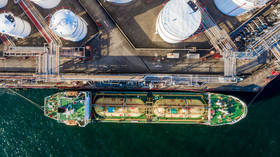
The EU’s biggest economy is a long way from replacing Russian pipeline supplies, data shows

© Getty Images/CHUNYIP WONG
Germany could be facing a shortage of liquefied natural gas (LNG) next winter as volumes secured under existing contracts are falling short of demand in the country, Bild am Sonntag reported on Sunday, citing Mark Helfrich, a member of the Bundestag’s committee on energy affairs.
In a letter to the Budget Committee, German Vice Chancellor Robert Habeck referred to statistics showing that current gas deals provide 75 billion cubic meters (bcm) of LNG, while the country needs 86 bcm to keep the EU’s largest economy running. Germany is therefore facing a deficit of 11 billion cubic meters of LNG.
Commenting on the data, Helfrich expressed concern about how the country will survive the next heating season as “there’s still no clarity on how LNG imports could be increased.”
Berlin managed to reduce its dependence on Russian energy last year by importing LNG through European neighbors and boosting pipeline gas flows from Norway and the Netherlands. However, its gas stores had been filled over the summer, when Russian gas was still flowing directly to the country.
READ MORE: EU’s cheap gas era over – IEA
German gas storage facilities are currently well filled, and there is no immediate danger of shortages. However, once the stores run dry later this year and the time comes to refill them for the next heating season, Germany could face shortages and will again be forced to introduce energy saving measures.
“For the economy, it will mean a reduction in output,” Helfrich warned.
Germany is still a long way from fully substituting Russian pipeline gas supplies with LNG, estimates show. Even with more import terminals coming online, the energy crisis will reportedly loosen its grip only in 2026, when additional production capacity from the US or Qatar becomes available.
For more stories on economy & finance visit RT’s business section




